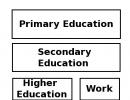Education in Great Britain - Образование в Великобритании (5), устная тема по английскому языку с переводом. Топик. Образование в Британии (топик) Школы великобритании на английском языке с переводом
Twelve million children attend about 40.000 schools in Britain. Education in Great Britain is compulsory and free for all children between the ages of 5 and 16. There are many children who attend a nursery school from the age of 3, but it is not compulsory. In nursery schools they learn some elementary things such as numbers, colours, and letters. Apart from that, babies play, have lunch and sleep there. Whatever they do, there is always someone keeping an eye on them.
Compulsory education begins at the age of 5 when children go to primary school. Primary education lasts for 6 years. It is divided into two periods: infant schools (pupils from 5 to 7 years old) and junior schools (pupils from 7 to 11 years old). In infant schools children don"t have real classes. They mostly play and learn through playing. It is the time when children just get acquainted with the classroom, the blackboard, desks and the teacher. But when pupils are 7, real studying begins. They don"t already play so much as they did it in infant school. Now they have real classes, when they sit at desks, read, write and answer the teacher"s questions.
Compulsory secondary education begins when children are 11 or 12 and lasts for 5 years. Secondary school is traditionally divided into 5 forms: a form to each year. Children study English, Mathematics, Science, History, Art, Geography, Music, a Foreign language and have lessons of Physical training. Religious education is also provided. English, Mathematics and Science are called "core" subjects. At the age of 7,11 and 14 pupils take examinations in the core subjects.
There are 3 types of state secondary schools in Great Britain. They are:
1.
comprehensive schools, which take pupils of all abilities without exams. In such schools pupils are often put into certain sets or groups, which are formed according to their abilities for technical or humanitarian subjects. Almost all senior pupils (around 90 per cent) go there;
2.
grammar schools, which give secondary education of a very high standard. Entrance is based on the test of ability, usually at 11. Grammar schools are single sexed schools;
3.
modern schools, which don"t prepare pupils for universities. Education in such schools gives good prospects for practical jobs.
After five years of secondary education, at the age of 16, pupils take the General Certificate of Secondary Education (GCSE) examination. When they are in the third or in the forth form, they begin to choose their exam subjects and prepare for them.
After finishing the fifth form pupils can make their choice: they may either leave school and go to a Further Education College or continue their education in the sixth form. Those who stay at school after GCSE, study for 2 more years for "A" (Advanced) Level Exams in two or three subjects which is necessary to get a place at one of British universities.
There are also about 500 private schools in Great Britain. Most of these schools are boarding ones, where children live as well as study. Education in such schools is very expensive, that"s why only 5 per cent of schoolchildren attend them. Private schools are also called preparatory (for children up to 13 years old) and public schools (for pupils from 13 to 18 years old). Any pupil can enter the best university of the country after leaving this school. The most famous British public schools are Eton, Harrow and Winchester.
After leaving secondary school young people can apply to a university, a polytechnic or a college of further education.
There are 126 universities in Britain. They are divided into 5 types:
The Old ones, which were founded before the 19th century, such as Oxford and Cambridge;
The Red Brick, which were founded in the 19th or 20th century;
The Plate Glass, which were founded in 1960s;
The Open University It is the only university offering extramural education. Students learn subjects at home and then post ready exercises off to their tutors for marking;
The New ones. They are former polytechnic academies and colleges.
The best universities, in view of "The Times" and "The Guardian", are The University of Oxford, The University of Cambridge, London School of Economics, London Imperial College, London University College.
Universities usually select students basing on their A-level results and an interview.
After three years of study a university graduate get the Degree of a Bachelor of Arts, Science or Engineering. Many students then continue their studies for a Master"s Degree and then a Doctor"s Degree (PhD).
Образование в Великобритании (5)
В Великобритании 12 миллионов детей посещают около 40 тысяч школ. Образование здесь обязательное и бесплатное для детей от 5 до 16 лет. Многие дети идут в детский сад, когда им исполняется 3 года, но это не обязательно. В детских садах дети познают элементарные основы, такие как цифры, цвета и буквы. Помимо этого, они там же играют, едят и спят. Что бы они ни делали, за ними всегда кто-то присматривает.
Обязательное образование начинается с 5 лет, когда дети идут в начальную школу. Начальное образование длится 6 лет. Оно подразделяется на 2 периода: школа для малышей (с 5 до 7 лет) и начальная школа (с 7 до 11 лет). В младшей школе у детей нет уроков. Они в основном играют и учатся через игру. Это время, когда дети ещё только знакомятся с классной комнатой, доской, партами и учителем. Но когда детям исполняется 7 лет, для них начинается настоящая учёба. Они уже не уделяют столько времени игре, как это было в младшей школе. Теперь у них настоящие уроки: они сидят за партами, читают, пишут и отвечают на вопросы учителя.
Обязательное среднее образование начинается, когда детям исполняется 11 или 12 лет, и длится 5 лет. Средняя школа по традиции делится на 5 классов - по классу на год обучения. Дети изучают родной язык, математику, естествознание, историю, изобразительное искусство, географию, музыку, какой-либо иностранный язык и занимаются физкультурой. Предусмотрено и преподавание религии. Английский язык, математика и естествознание являются основными предметами. В возрасте 7, 11 и 14 лет школьники сдают экзамены по основным предметам.
Существует 3 вида государственных школ среднего образования:
1.
Общеобразовательные школы. Они принимают учеников с любыми способностями без вступительных экзаменов. В таких школах дети обычно распределяются по разным группам - в зависимости от их уровня владения техническими или гуманитарными предметами. Практически все старшеклассники (около 90 %) идут в эти школы.
2.
Грамматические школы. Они дают среднее образование на очень высоком уровне. Поступление в такую школу зависит от результатов письменного экзамена, который дети сдают в возрасте 11 лет. В грамматических школах практикуется раздельное обучение мальчиков и девочек.
3.
Современные школы. Они не готовят детей к поступлению в университет. Обучение в таких школах даёт перспективы только в рабочей сфере деятельности.
После пяти лет обучения в средней школе, в возрасте 16 лет, ученики сдают экзамен на получение сертификата об окончании средней школы. Уже в 3-м или 4-м классе они начинают выбирать предметы для сдачи экзаменов и занимаются подготовкой к ним.
По окончании 5-го класса ребятам предоставляется выбор: они могут либо окончить школу и продолжить обучение в колледже, либо перейти в 6-й класс. Те, кто остаётся в школе после экзамена на получение сертификата об окончании средней школы, учатся ещё 2 года, после чего сдают экзамены уровня «А» по двум или трём предметам, что необходимо для поступления в один из британских университетов.
В Великобритании также существует около 500 частных, или независимых, школ. Большинство из них являются школами-интернатами, где дети не только учатся, но и живут. Обучение в таких школах стоит очень дорого, поэтому их посещает только 5 % всех школьников. Существуют подготовительные частные школы (для детей до 13 лет) и привилегированные частные школы (для детей от 13 до 18 лет). Наиболее известные частные школы Великобритании: Итон, Харроу, Винчестер.
После того как учащийся окончил школу, он имеет право подать заявление в университет, техникум или колледж для дальнейшего образования.
В Великобритании 126 университетов. Они делятся на 5 типов:
- древние. Основаны до XIX в., к их числу относятся Оксфорд и Кембридж;
- «Красного кирпича» (Red Brick). Основаны в XIX или XX в.;
- «Стеклянные» (Plate Glass). Основаны в 1960-х гг.;
- Открытый университет (Open University). Это единственный университет, предлагающий заочное образование. Студенты изучают предметы дома, а затем посылают готовые задания преподавателям на проверку;
- новые. К ним относятся бывшие политехнические академии и колледжи.
По мнению журналов Тайме и Гардиан, лучшими университетами являются: Оксфорд, Кембридж, Лондонская школа экономики, Имперский колледж Лондона, Университетский колледж Лондона.
Получение места в университете зависит от результата экзаменов уровня «А».
После трёх лет обучения выпускник университета получает степень бакалавра гуманитарных, естественных или технических наук. Многие студенты продолжают учёбу, чтобы получить степень магистра, а затем и доктора наук.
Questions:
1. When do British boys and girls begin to go to school?
2. What subjects do they study at school?
3. How long does secondary education last?
4. What subjects are called "core" subjects?
5. At what age do children have their exams?
6. What"s the difference between modern and grammar schools?
7. What are private schools?
8. Would you like to study in Britain? Why?
9. Compare British and Russian education.
10. What types of British universities do you know?
Vocabulary:
compulsory - обязательный
free - бесплатный
to attend - посещать
nursery school - детский сад (государственный)
letter - буква
to keep an eye on smb. - следить за кем-либо
primary school - младшие классы, начальная школа, школа первой ступени
infant school - школа для малышей, младшая школа
junior school - начальная школа (для детей от 7 до 11 лет)
to get acquainted - знакомиться
secondary education - среднее образование
to be divided into - делиться на
Science - естествознание
Art - изобразительное искусство
core subject - основной предмет
comprehensive school - общеобразовательная школа
according to - в соответствии с
ability - способность
grammar school - грамматическая школа
entrance - поступление
single sexed school - школы для мальчиков и для девочек (разделённые по половому признаку)
modern school - современная школа
GCSE - экзамен на сертификат об окончании среднего образования
"A" (advanced) Level Exam - экзамен уровня "А" (продвинутого)
private school - частная школа
boarding school - школа-интернат, школа-пансион
preparatory school - подготовительная частная школа
public school - привилегированная частная школа
to apply - подавать заявление
extramural - заочный, вечерний
polytechnic - политехникум
tutor - преподаватель
Degree of a Bachelor - степень бакалавра
Master"s Degree - степень магистра
Doctor"s Degree - докторская степень
All state schools in Britain are free, and schools provide their pupils with books and equipment for their studies.
Nine million children attend 35.000 schools in Britain. Education is compulsory from 5 till 16 years. Parents can choose to send their children to a nursery school or a pre-school playgroup to prepare them for the start of compulsory education.
Children start primary school at 5 and continue until they are 11. Most children are taught together, boys and girls in the same class. At 11 most pupils go to secondary schools called comprehensives which accept a wide range of children from all backgrounds and religious and ethnic groups. Ninety per cent of secondary schools in England, Scotland and Wales are co-educational.
At 16 pupils take a national exam called «G.C.S.E.» (General Certificate of Secondary Education) and then they can leave school if they wish. This is the end of compulsory education.
Some 16-year-olds continue their studies in the sixth form at school or at a sixth form college. The sixth form prepares pupils for a national exam called «A» level (advanced level) at IS. Yon-need «A» level to enter a university.
Other 16-year-olds choose to go to a college of further education to study for more practical (vocational) diplomas relating to the world of work, such as hairdressing, typing or mechanics.
Universities and colleges of higher education accept students with «A» levels from 18. Students study for a degree which takes on average three years of full-time study.
Most students graduate at 21 or 22 and are given their degree at a special graduation ceremony.
Перевод топика: Система образования в Великобритании. Государственное образование
Во всех государственных школах Британии обучение бесплатное. Школы обеспечивают учащихся книгами и оборудованием для обучения.
Девять миллионов детей посещают 35 тыс. школ в Британии. Образование обязательно с пяти до шестнадцати лет. Родители могут отправить детей в ясли или в подготовительную группу, чтобы подготовить их к получению обязательного образования.
Дети начинают ходить в школу в пять лет и учатся там до одиннадцати лет. Большинство детей учатся вместе, мальчики и девочки, в одном классе. В 11 лет многие ученики идут в среднюю школу, называемую общеобразовательной, которую посещают дети различных социальных слоев, религиозных и этнических групп. В 90 % средних школ Англии, Шотландии и Уэльса обучение совместное.
В 16 лет ученики сдают экзамен для получения аттестата о среднем образовании. И после этого они могут уйти из школы, если захотят. На этом обязательное образование заканчивается.
Некоторые шестнадцатилетние продолжают обучение в шестом классе школы или в шестилетнем колледже. В шестом классе учеников готовят к государственному экзамену, называемому «А-уровень» — «продвинутый уровень». Этот экзамен сдается в 18 лет, он необходим для поступления в университет.
Другие шестнадцатилетние учащиеся идут в колледж для продолжения образования и получения дипломов о профобразовании, дающих возможность работать, например, парикмахерами, машинистами, механиками.
Университеты и колледжи высшего образования принимают студентов с 18 лет, сдавших экзамен продвинутого уровня. Студенты учатся для получения ученой степени. Учеба длится в среднем три года на стационаре.
Большинство студентов заканчивают университеты в 21 или 22 года. Им присуждаются степени на торжественной церемонии выпускников.
Every country has different educational system. There are Kindergarten, schools, college, university everywhere, but the period of education and program can be different even in two neighbor countries.
So Great Britain is one of the countries, where you can have the best education in the world.
At the age of two children go to kindergarten where they learn to count and write. 15 hours per week child can stay there for free, but extra hours have to be paid by parents. Kindergartens are not mandatory, so parents can keep children at home.
Primary education starts at the age of five to six. At this age children have to know counting and writing. But there are situations, when children don’t know this because they were at home all childhood. That’s why kindergartens are important. So at primary school children study English, maths, geography, music, art.
Secondary education starts at the age of 11. Here already you have to study Core subjects: maths, English and science. There are also subjects children can choose by themself.
You can finish school at the age of 16, but those who want to study at university have to continue at Sixth form and be ready for A-levels.
One more interesting thing is that in Great Britain children have marks: A, B, C. Minimum mark can be- U and that is very bad. And A is excellent.
High education in Great Britain is divided into University colleges, Polytechnics, Colleges of High Education. If you want to have the highest degree, you have to study about 8 years.
Well I see it’s not easy, but you can have great education and good profession in future.
Образование в Великобритании
В каждой стране существует своя система образования. Конечно, детский сад, школа, колледж и университет есть везде, но время обучения и программы могут быть совершенно разные даже в двух соседних странах.
Итак, Великобритания - одна из стран, где вы можете получить лучшее образование в мире. В возрасте 2 лет дети идут в детский сад, где они учатся писать и считать. 15 часов в неделю ребёнок может быть в саду бесплатно, за все дополнительные часы должны родители заплатить. Сады не обязательны для посещения, так что дети могут быть дома.
Начальная школа начинается в возрасте от 5 до 6 лет. В этом возрасте детки должны уметь писать и считать. Но бывают случаи, когда они этого всего не знают, ведь сидели дома вместо сада. Поэтому-то детские сады очень важны. В начальной школе детей учат английскому языку, математике, географии, музыке и искусству.
Средняя школа начинается в возрасте 11 лет. Здесь уже нужно изучать обязательные предметы: математику, английский язык и разные науки. Есть также предметы, которые дети выбирают сами.
Школу можно окончить и в 16 лет, но, если вы хотите учиться в университете, нужно продолжить обучение до 18 и получить за все предметы «отлично».
Ещё одна интересная вещь заключается в том, что в Великобритании дети получают отметки, типа, A,B,C. Минимальная отметка U- считается самой низкой, а А - это отлично.
Высшее образование в Великобритании разделено на колледж, политехникум и университет. Если вы хотите получить самую высокую степень образования, придётся учиться до 8 лет.
Так я вижу, что это нелегко, но вы можете получить отличное образование и иметь хорошую профессию в будущем.
Education in Great Britain is provided by the Local Education Authority (LEA) in each county. Until recently, each LEA was free to decide how to organize education in its own area. However, in 1988 the «National Curriculum» was introduced. It means that there is greater government control over what is taught in schools now.
Children under five don’t have to go to school, but there is some free nursery-school education before that age. The places are usually given to families in special circumstances, for example families with one parent only. That’s why in many areas parents have formed play groups where children under five years can go for a morning or afternoon a couple of times a week.
At the age of five children go to primary schools, first to infant schools for pupils aged from 5 to 7 and then to junior, schools for pupils from 8 to 11 years.
Some parents choose to pay for private education though there are free state schools. Private schools are called by different names compared to state schools. The preparatory schools are for pupils aged up to 13, and the public schools are for 13 to 18 year-olds. These schools are very expensive and they are attended only by about 5 per cent of the schoolchildren.
Free secondary education has been available to all children in Britain since 1944. Children must go to school until the age of 16, and pupils may stay on for one or two years more if they wish.
Over 80 per cent of schoolchildren go to comprehensive schools at the age of 11. These schools are not selective - you don’t have to pass an exam to go there. But before 1965 all children took an exam at the age of 11 called the «11+». The top 20 per cent were chosen to go to the academic grammar schools. Those who failed the «11+» went to secondary modern schools. A lot of people thought that this system of selection at the age of 11 was unfair on many children. So comprehensive schools were introduced to offer education for pupils of all abilities. There are a few LEAs who still keep the old system, but most LEAs have now changed over completely to nonselective education in comprehensive schools.
Comprehensive schools want to develop the talents of each individual child. So they offer a wide choice of subjects, from art and craft, woodwork and domestic science to the sciences, modern languages, computer studies, etc. All these subjects are enjoyed by both girls and boys. All pupils move to the next class automatically at the end of the year.
At the age of 14 or 15 pupils begin to choose their exam subjects. In 1988 a new public examination - the General Certificate of Secondary Education (GCSE) - was introduced for 16 year- olds. This examination assesses pupils on the work they do in the 4th and 5th year at secondary school, For University entrance pupils have to take «А» Level (Advanced Level) GCE exam.
Many people decide to leave school at the age of 16 and go to a Further Education (FE) College for practical vocational training, for example in engineering, typing, cooking or hairdressing.
Education in Britain is compulsory and free for all children.
Primary education begins at the age of 5 in England, Wales and Scotland, and 4 in Northern Ireland. It includes three age ranges: nursery for children under 5 years, infants from 5 to 7, and juniors from 7 to 11 years old. In nursery schools babies don’t have real classes, they learn some elementary things such as numbers, colours and letters. Besides, they play, have lunch and sleep there. Children usually start their school education in an infant school and move to a junior school at the age of 7.
Compulsory secondary education begins when children are 11 or 12 and lasts for 5 years: one form to each year. Secondary schools are generally much larger than primary ones. Pupils in England and Wales begin studying a range of subjects stipulated under the National Curriculum. Religious education is available in all schools, although parents have the right to withdraw their children from such classes.
About 5 per cent of schoolchildren attend fee-paying private or public schools. Most of these schools are boarding ones, where children live as well as study. The most famous British public schools are Eton, Harrow and Winchester.
The large majority of British schools teach both boys and girls together. But grammar schools, which give state secondary education of a very high standard, teach boys and girls separately.
The school year in England and Wales starts in September and ends in July. In Scotland it runs from August to June and in Northern Ireland from September to June and has three terms. At 7 and 11 years old, and then at 14 and 16 at secondary school, pupils take examinations in the core subjects (English, Mathematics and Science).
The main school examination, the General Certificate of secondary education (GCSE) examination is taken at the age of 16. If pupils are successful, they can make their choice: they may either go to a Further Education College or a Polytechnic or they may continue their education in the sixth form. Those who stay at school after GCSE, study for 2 more years for "A" (Advanced) Level Exams in two or three subjects which is necessary to enter one of British universities. Universities usually select students basing on their A-level results and an interview. After three years of study a university graduate gets the Degree of a Bachelor of Arts, Science or Engineering. Many students then continue their studies for a Master"s Degree and then a Doctor"s Degree (PhD).

Перевод
Британское образование обязательно и бесплатно для всех детей.
Начальное образование начинается в 5 лет в Англии, Уэльсе и Шотландии, и в 4 года – в Северной Ирландии. Оно включает три возрастных диапазона: ясли для детей до 5 лет, начальная школа от 5 до 7 лет и младшая школа для детей 7-11 лет. В детских садах у малышей еще нет настоящих уроков, их обучают лишь некоторым элементарным вещам: цифрам, цветам и буквам. Кроме того, они играют, обедают и спят. Дети обычно начинают свое образование в начальной школе и далее в младшей школе в возрасте 7 лет.
Обязательное среднее образование начинается в возрасте 11 или 12 лет и продолжается в течение 5 лет: по одному классу на каждый год. Средние школы, как правило, намного больше начальных. Ученики в Англии и Уэльсе приступают к изучению комплекса предметов, подразумеваемых Национальной программой. Религиозное образование также присутствует во всех школах, хотя родители имеют право отказаться от этих занятий.
Около 5% школьников посещают платные частные школы. Большая часть таких школ является интернатами, то есть дети в них и живут, и обучаются. Самыми знаменитыми британскими частными школами считаются Итон, Хэрроу и Винчестер.
Большинство британских школ обучает мальчиков и девочек вместе. Однако «грамматические» школы, которые дают государственное среднее образование на очень высоком уровне, занимаются с мальчиками и девочками отдельно.
Учебный год в Англии и Уэльсе начинается в сентябре и заканчивается в июле. В Шотландии он длится с августа по июнь, а в Северной Ирландии – с сентября по июнь и состоит из трех семестров. В возрасте 7 и 11 лет, а потом 14 и 16 лет в средних школах дети сдают экзамены по основным предметам (английский, математика и естествознание).
Главный школьный экзамен на сертификат о среднем образовании (GCSE) проводится в возрасте 16 лет. Если ученики сдают его успешно, у них есть выбор: они могут либо поступить в Колледж дополнительного образования или в политехническую школу, либо продолжить свое образование в шестом классе. Те, кто остается в школе после GCSE, учатся еще 2 года для того, чтобы сдать экзамены продвинутого уровня «А» по двум-трем предметам, что является необходимым условием для поступления в британский университет. Университеты обычно отбирают студентов по результатам «А» экзаменов и собеседования. Через 3 года обучения выпускник университета получает Степень бакалавра гуманитарных, естественных или технических наук. Многие студенты далее продолжают обучение для получения Степени магистра и после Степени доктора.






